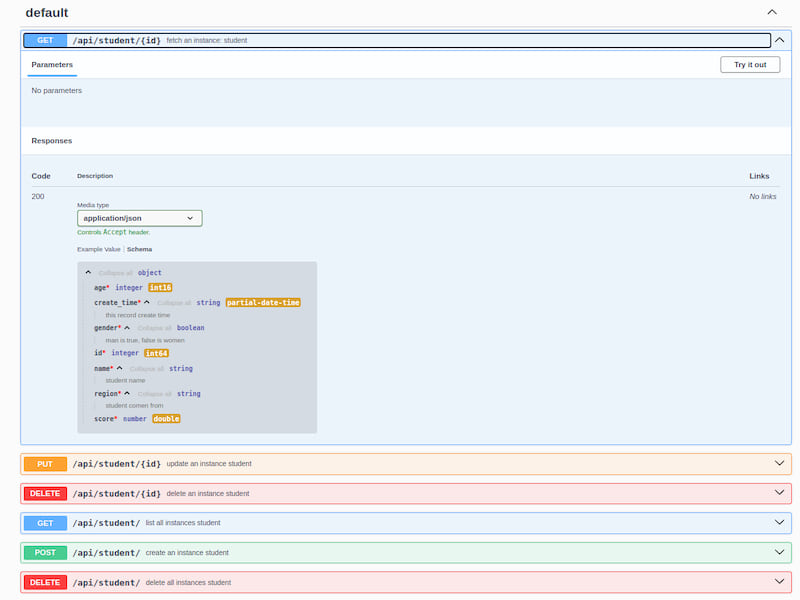6 releases (3 breaking)
| 0.5.0 | Dec 19, 2023 |
|---|---|
| 0.4.0 | Sep 26, 2023 |
| 0.3.2 | Jun 9, 2023 |
| 0.3.1 | Apr 28, 2023 |
| 0.2.0 | Apr 1, 2023 |
#1627 in HTTP server
87KB
849 lines
axum-restful
A restful framework based on axum and sea-orm. Inspired by django-rest-framework.
The goal of the project is to build an enterprise-level production framework.
Features
- a Trait for the
structgenerated bysea-ormto provide with GET, PUT, DELETE methods tlssupportprometheusmetrics and metrics servergraceful shutdownsupportswagger documentgenerate based onaide
Quick start
A full example is exists at axum-restful/examples/demo.
First, you can create a new crate like cargo new axum-restful-demo.
Build a database service
You should have a database service before. It is recommended to use postgresql database.
you can use docker and docker compose to start a postgresql
create a compose.yaml in the same directory as Cargo.toml
services:
postgres:
image: postgres:15-bullseye
container_name: demo-postgres
restart: always
volumes:
- demo-postgres:/var/lib/postgresql/data
ports:
- "127.0.0.1:5432:5432"
environment:
- POSTGRES_DB=${POSTGRES_DB}
- POSTGRES_USER=${POSTGRES_USER}
- POSTGRES_PASSWORD=${POSTGRES_PASSWORD}
volumes:
demo-postgres: {}
a .envfile like
# config the base pg connect params
POSTGRES_DB=demo
POSTGRES_USER=demo-user
POSTGRES_PASSWORD=demo-password
# used by axum-restful framework to specific a database connection
DATABASE_URL=postgres://${POSTGRES_USER}:${POSTGRES_PASSWORD}@localhost:5432/${POSTGRES_DB}
finally, you can build a service with docker compose up -d
Write and migrate a migration
For more details, please refer to the sea-orm documentation.
Install the sea-orm-cli with cargo
$ cargo install sea-orm-cli
Configure dependencies and workspace in Cargo.toml
[package]
name = "demo"
version = "0.1.0"
edition = "2021"
# See more keys and their definitions at https://doc.rust-lang.org/cargo/reference/manifest.html
[workspace]
members = [".", "migration"]
[dependencies]
aide = "0.13"
axum = "0.7"
axum-restful = "0.5"
chrono = "0.4"
migration = { path = "./migration" }
once_cell = "1"
schemars = { version = "0.8", features = ["chrono"] }
sea-orm = { version = "0.12", features = ["macros", "sqlx-postgres", "runtime-tokio-rustls"] }
sea-orm-migration = { version = "0.12", features = ["sqlx-postgres", "runtime-tokio-rustls",] }
serde = { version = "1.0", features = ["derive"] }
serde_json = "1.0"
tokio = { version = "1", features = ["full"] }
tracing = "0.1"
tracing-subscriber = "0.3"
Setup the migration directory in ./migration
$ sea-orm-cli migrate init
project structure changed into
├── Cargo.lock
├── Cargo.toml
├── compose.yaml
├── migration
│ ├── Cargo.toml
│ ├── README.md
│ └── src
│ ├── lib.rs
│ ├── m20220101_000001_create_table.rs
│ └── main.rs
└── src
└── main.rs
edit the m20****_******_create_table.rs file blow ./migration/src
use sea_orm_migration::prelude::*;
#[derive(DeriveMigrationName)]
pub struct Migration;
#[async_trait::async_trait]
impl MigrationTrait for Migration {
async fn up(&self, manager: &SchemaManager) -> Result<(), DbErr> {
// Replace the sample below with your own migration scripts
manager
.create_table(
Table::create()
.table(Student::Table)
.if_not_exists()
.col(
ColumnDef::new(Student::Id)
.big_integer()
.not_null()
.auto_increment()
.primary_key(),
)
.col(ColumnDef::new(Student::Name).string().not_null())
.col(ColumnDef::new(Student::Region).string().not_null())
.col(ColumnDef::new(Student::Age).small_integer().not_null())
.col(ColumnDef::new(Student::CreateTime).date_time().not_null())
.col(ColumnDef::new(Student::Score).double().not_null())
.col(
ColumnDef::new(Student::Gender)
.boolean()
.not_null()
.default(Expr::value(true)),
)
.to_owned(),
)
.await
}
async fn down(&self, manager: &SchemaManager) -> Result<(), DbErr> {
// Replace the sample below with your own migration scripts
manager
.drop_table(Table::drop().table(Student::Table).to_owned())
.await
}
}
/// Learn more at https://docs.rs/sea-query#iden
#[derive(Iden)]
enum Student {
Table,
Id,
Name,
Region,
Age,
CreateTime,
Score,
Gender,
}
edit migration/Cargo.toml to add dependencies
[dependencies]
...
axum-restful = "0.5"
edit migration/src/main.rs to specific a database connection an migrate
use sea_orm_migration::prelude::*;
#[async_std::main]
async fn main() {
// cli::run_cli(migration::Migrator).await;
let db = axum_restful::get_db_connection_pool().await;
migration::Migrator::up(db, None).await.unwrap();
}
migrate the migration files
$ cd migration
$ cargo run
finally, you can see two tables named sql_migrations and studentgenerated.
Generate entities
at the project root path
$ sea-orm-cli generate entity -o src/entities
will generate entities configure and code, now project structure changed into
├── Cargo.lock
├── Cargo.toml
├── compose.yaml
├── migration
│ ├── Cargo.toml
│ ├── README.md
│ └── src
│ ├── lib.rs
│ ├── m20220101_000001_create_table.rs
│ └── main.rs
└── src
├── entities
│ ├── mod.rs
│ ├── prelude.rs
│ └── student.rs
└── main.rs
edit the src/entities/student.rs to add derive Default, Serialize, Deserialize
//! `SeaORM` Entity. Generated by sea-orm-codegen 0.11.0
use schemars::JsonSchema;
use sea_orm::entity::prelude::*;
use serde::{Deserialize, Serialize};
#[derive(Clone, Debug, PartialEq, JsonSchema, DeriveEntityModel, Serialize, Deserialize)]
#[sea_orm(table_name = "student")]
pub struct Model {
#[sea_orm(primary_key)]
pub id: i64,
pub name: String,
pub region: String,
pub age: i16,
pub create_time: DateTime,
#[sea_orm(column_type = "Double")]
pub score: f64,
pub gender: bool,
}
#[derive(Copy, Clone, Debug, EnumIter, DeriveRelation)]
pub enum Relation {}
impl ActiveModelBehavior for ActiveModel {}
edit src/main.rs
use schemars::JsonSchema;
use sea_orm_migration::prelude::MigratorTrait;
use tokio::net::TcpListener;
use axum_restful::swagger::SwaggerGeneratorExt;
use axum_restful::views::ModelViewExt;
use crate::entities::student;
mod check;
mod entities;
#[tokio::main]
async fn main() {
tracing_subscriber::fmt::init();
let db = axum_restful::get_db_connection_pool().await;
let _ = migration::Migrator::down(db, None).await;
migration::Migrator::up(db, None).await.unwrap();
tracing::info!("migrate success");
aide::gen::on_error(|error| {
tracing::error!("swagger api gen error: {error}");
});
aide::gen::extract_schemas(true);
/// student
#[derive(JsonSchema)]
struct StudentView;
impl ModelViewExt<student::ActiveModel> for StudentView {
fn order_by_desc() -> student::Column {
student::Column::Id
}
}
let path = "/api/student";
let app = StudentView::http_router(path);
check::check_curd_operate_correct(app.clone(), path, db).await;
// if you want to generate swagger docs
// impl OperationInput and SwaggerGenerator and change app into http_routers_with_swagger
impl aide::operation::OperationInput for student::Model {}
impl axum_restful::swagger::SwaggerGeneratorExt<student::ActiveModel> for StudentView {}
let app = StudentView::http_router_with_swagger(path, StudentView::model_api_router()).await.unwrap();
let addr = "0.0.0.0:3000";
tracing::info!("listen at {addr}");
tracing::info!("visit http://127.0.0.1:3000/docs/swagger/ for swagger api");
let listener = TcpListener::bind(addr).await.unwrap();
axum::serve(listener, app.into_make_service()).await.unwrap();
}
StudentView impl the ModelView<T>, the T is student::ActiveModel that represent the student table configure in the database, if will has full HTTP methods with GET, POST, PUT, DELETE.
you can see the server is listen at port 3000
Verify the service
Swagger
if you impl axum_restful::swagger::SwaggerGenerator above, then you can visit http://127.0.0.1:3000/docs/swagger/ at your browser, you will see a swagger document is generated

License
Licensed under either of
- Apache License, Version 2.0 (LICENSE-APACHE or http://www.apache.org/licenses/LICENSE-2.0)
- MIT license (LICENSE-MIT or http://opensource.org/licenses/MIT)
at your option.
Contribution
Unless you explicitly state otherwise, any contribution intentionally submitted for inclusion in the work by you, as defined in the Apache-2.0 license, shall be dual licensed as above, without any additional terms or conditions.
Dependencies
~79MB
~1M SLoC